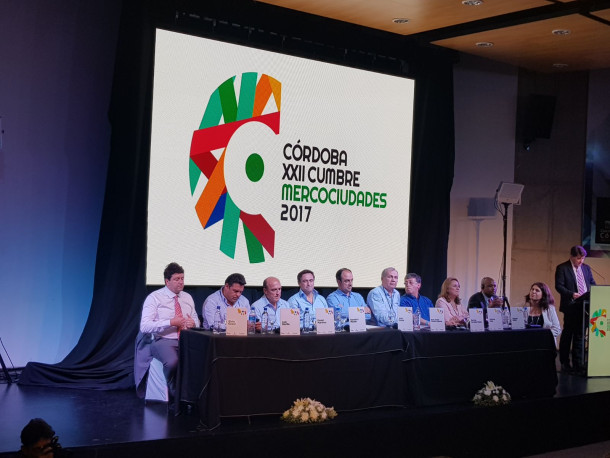 Nelson Fernandez
Nelson Fernandez
Córdoba, meeting point for the Mercosur metropolises
From 29 November to 1 December, Córdoba hosted the 22nd Mercociudades Summit, a network that brings together governments from over 300 cities in South America, including 14 Metropolis members. The event was the perfect opportunity to strengthen the visibility and involvement of local governments, as well as the links between Metropolis members in Latin America, and was a chance to encourage greater cooperation between different city networks.
The meeting was attended by over 500 participants, including delegations from Buenos Aires, Mexico City, La Paz, Medellín, Montevideo, Montreal, Porto Alegre, Quito and Rosario. Staff members from some of these metropolises and other cities began their participation the day before the official launch of the summit, by taking part in a workshop on planning to meet the Sustainable Development Goals (SDGs), carried out under the auspices of the UCLG. The workshop served as inspiration to align local development plans to the goals and indicators in the 2030 Agenda.
On 29 November, the summit opened to the general public with a panel titled "Decentralised cooperation and the role of cities in international networks", which was a follow-up to the debate on the impact of global agendas on local situations and vice versa. The panel was driven by the moderators Agustí Fernández (CIDOB) and María Romero (National University of Rosario), who posed questions to representatives from a range of entities promoting the role of cities on a regional and international level: Mercociudades (Jorge Rodríguez), UCLG (Sara Höflich), UN-Habitat (Elkin Velázquez), AL-LAs Project (Braulio Díaz), the city of Montreal (Simon Langelier), Metropolis (Lia Brum) and UCCI (José Antonio Mancebo). On the one hand, they praised the achievements reached by working in city networks, such as the participation of local governments in the Habitat III process and their involvement in drafting the New Urban Agenda. On the other hand, the panellists agreed on the challenges faced in order to comply with the SDGs and other internationally established commitments, which requires not only for city internationalisation strategies to be set as public policies, but also for the international organisations involved to work more closely together, sharing discourses and work tools.
On 30 November the summit featured other open panels, sharing the experiences of some of our members on issues related to government innovation and open data, as well as citizen participation and new management models. Rosario Fossati, from the Montevideo Department of Sustainable and Intelligent Development, presented a range of apps developed and used by citizens as part of the shared management of the city. Marcelo Cossar, Córdoba Secretary for Modernisation, explained that transparency is a cross-cutting aspect throughout local administration.
During the program sessions, the leadership of the mayor of Córdoba, Ramón Javier Mestre, came to the fore, as he took on the presidency of Mercociudades at the end of the summit. In the High Level Dialogue between Mayors that began to draw the summit to a close, on 30 November, the host highlighted the role of local government in citizens' lives throughout the Southern Cone, while emphasising the importance of working together to have a global impact. The session was notably attended by the mayor of Montevideo and vice-president of Metropolis, Daniel Martínez; the mayor of La Paz, Luis Revilla; and the Mayor of Rosario, Monica Fein, who spoke in favour of gender equality at a table in which men were the majority. The next Mercociudades Summit will be held in La Paz at the end of 2018.

